Eighty years after the Battle of Okinawa, thousands of victims remain unaccounted for. One man continues to search for the remains and belongings of those who died so they can finally be returned to the bereaved families.
*Content warning: This article and video below contains images of human remains.
Gushiken Takamatsu has always known Okinawa’s jungles held the remains of war dead, waiting to be found. He found his first bone as a child near his home in Naha.
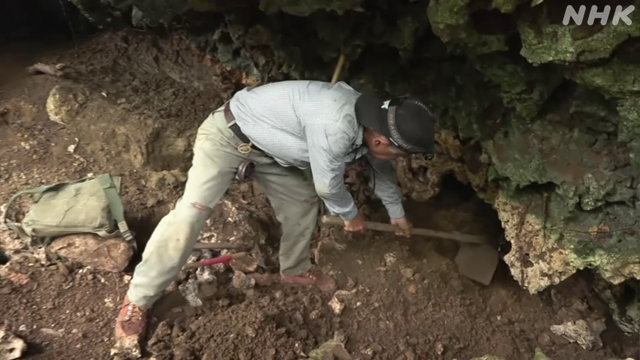
Gushiken Takamatsu in the jungle where he searches for remains of the war dead
Now 71, Gushiken has spent decades searching for those left behind in one of World War Two’s deadliest battles. More than 200,000 people died during the 1945 Battle of Okinawa, and the prefecture estimates that over 2,500 are still missing.
For years, Gushiken worked alone. Then, in 1983, he founded a volunteer group called “Gamafuya” which translates from a local dialect to “people who dig in caves”. The organization has since recovered the bones of between 300 to 400 people.
Once or twice a month, he ventures into the jungle near Itoman City, the conflict’s last battleground.
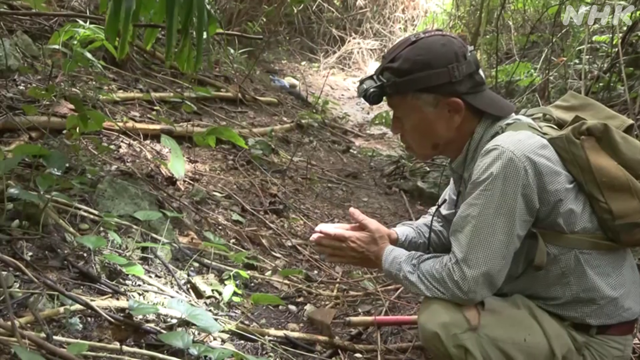
Gushiken clasps his hands and prays over remains.
Gushiken said he wondered at first why families hadn’t come to retrieve the remains themselves. But he realized that the remains of many battle casualties were mingled together, so identifying their kin would have been nearly impossible.
Reuniting such families is Gushiken’s aim.
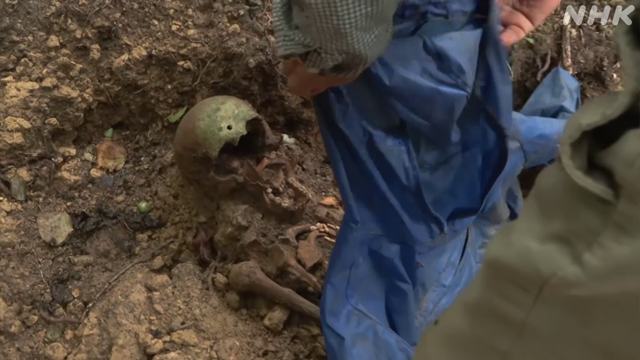
A weathered skull lies half-buried in the Okinawa soil.
“I realized these remains really want to go home to their mothers. If I can, I want to make their last wishes come true,” he said.
Lost forever
After the war, the United States military built dozens of bases in Okinawa.
Now, a controversial plan to relocate Futenma Air Base to reclaimed land off Nago’s Henoko district threatens to unearth and potentially destroy human remains. Soil for the project is being collected from former battlefields.
Any large remains recovered would be returned to the families, but Gushiken says even unidentifiable fragments should not be discarded.
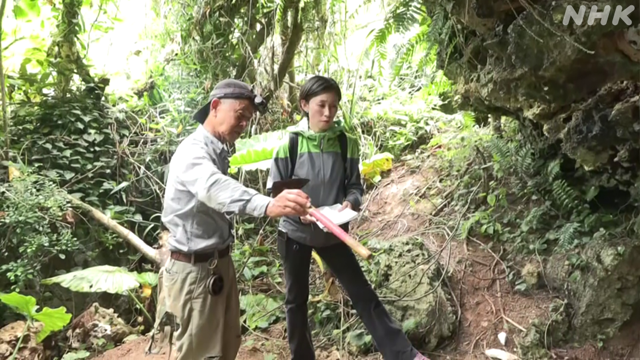
“The place should be passed down to the next generation as a site for remembrance, a place to think about war and peace,” he said. “We’d like to preserve them as World Peace Heritage sites.”
Search for long-lost sister
For 82-year-old Kobashigawa Tomoyuki, the loss is personal and painful. His sister Michiko was 19 when she died in the battle. He was only 2.
He didn’t even know she existed until eight years ago.
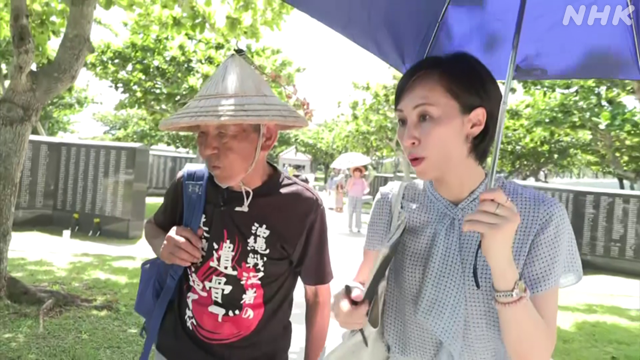
Kobashigawa Tomoyuki and NHK World’s Yamasawa Rina
His parents never spoke of her. Struggling to rebuild their lives after the war, they buried her memory.
It was only when his older brother stumbled upon the truth eight years ago that Kobashigawa learned he had once had a sister.
“I wanted her to be alive,” he said. “I just want to hold her in my arms.”
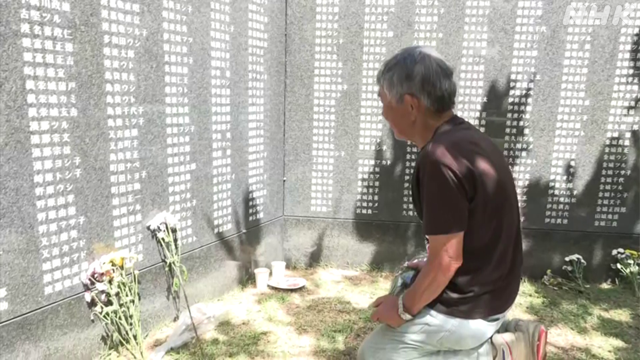
Kobashigawa prays in front of the Cornerstone of Peace in Itoman, where his sister’s name is etched in stone.
He prays for her every year at the Cornerstone of Peace, a monument to the dead at the Okinawa Prefectural Peace Memorial Park in Itoman. Her engraved name on its wall is all he has of her.
Kobashigawa said he believes it is his duty to find Michiko before his own time runs out. He recently submitted samples of his DNA to Japan’s health ministry, hoping that her remains will be found.
“One day, when I find her, I will tell her: ‘You must have suffered. You must have felt such pain and sorrow, but it’s all right now.’ Otherwise, I just won’t feel at ease. It’s as if I’m always carrying something heavy in my heart.”
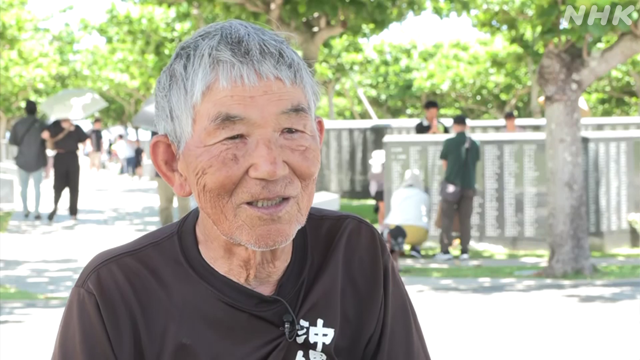
Kobashigawa
Last year, Japan’s Defense Ministry deployed a ground-to-ship missile system to a base near his home in Uruma City. He sees this development as an echo of the past, and perhaps a harbinger of the future.
Kobashigawa
“Missiles were also deployed where I live. With that, I feel like a new war has already started. Many people in Okinawa lost their lives, and we are still looking for remains. Now I am worried about my children and grandchildren becoming victims of war.”
‘The same human’
Okinawa Prefecture offers subsidies to organizations who hunt for the missing, and the national government also sends search teams. But the vast majority of the work falls to volunteers like Gushiken.
What keeps him going?
“If I were in the same position, I’d want someone to help me. I am the same human as those who died here. That’s why I do as much as I can,” he said.
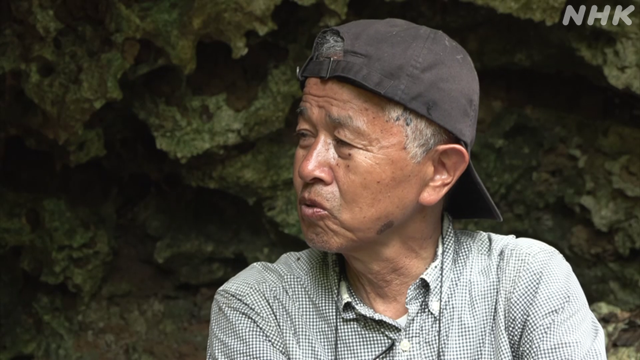
Gushiken Takamatsu says we should expose the past to learn from it.
Gushiken believes the past must be acknowledged, not paved over. Only then can it serve as a warning.
“I want people to understand the true nature of war—that it means killing and being killed. I want them to see the reality of those who were killed and realize why it must never be allowed to happen again,” he said.
“I hope young people who have never experienced war will come to understand.”

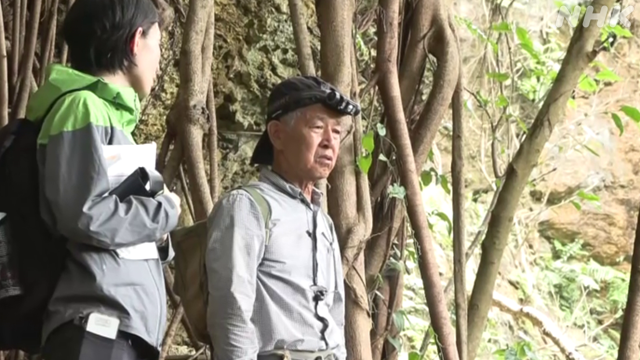
AloJapan.com